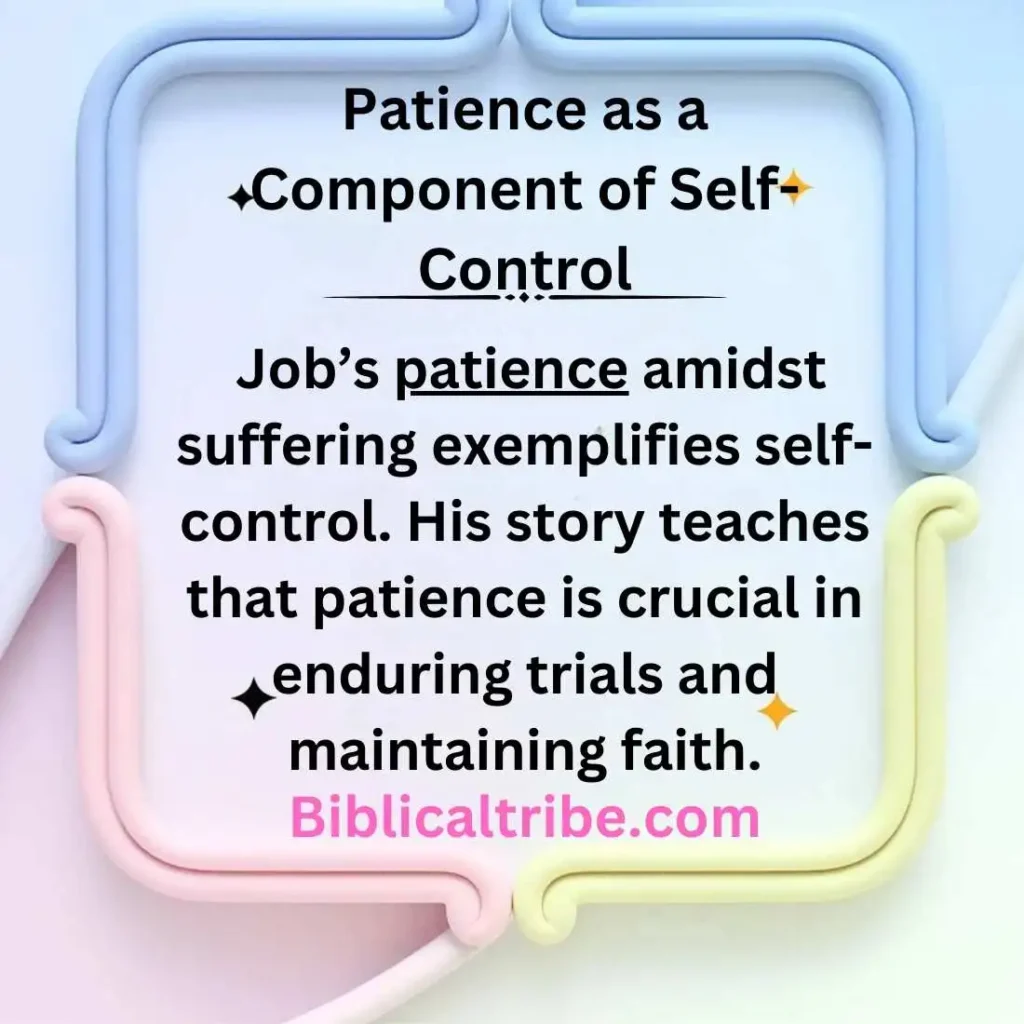Last Updated on November 10, 2024 by Ethan Richards
Self-control is a cornerstone of biblical teaching and spiritual growth. It’s often depicted as a powerful force in overcoming temptation and developing a deeper relationship with God.
This blog post delves into the concept of self-control as outlined in the Bible, exploring key examples, teachings, and practical applications for today.
Discover the transformative power of self-control as taught in the Bible, unlocking practical insights for everyday life. Through Biblical teachings, gain tools for overcoming temptation and building a stronger character rooted in faith. Learn how self-control can lead to deeper spiritual growth and lasting peace.
Whether you’re looking to enhance your personal discipline or understand its significance in biblical context, this comprehensive guide offers valuable insights and actionable steps.
Biblical Examples of Self-Control

Joseph and Potiphar’s Wife
Context: Joseph, one of the twelve sons of Jacob, found himself in a precarious situation while serving Potiphar, an officer of Pharaoh.
Potiphar’s wife attempted to seduce him, a significant test of his self-control.
Joseph’s Response: Despite the temptation, Joseph firmly resisted. He stated, “How then could I do such a wicked thing and sin against God?” (Genesis 39:9, NIV).
His response highlights his commitment to integrity and divine obedience over personal gratification.
Lessons Learned:
- Moral Integrity: Joseph’s ability to withstand temptation illustrates the importance of moral integrity.
- Divine Reward: His faithfulness eventually led to his rise to power in Egypt, showing how self-control can result in divine favor and personal advancement.
Daniel’s Food Choice
Context: Daniel and his friends were taken to Babylon and were offered the king’s delicacies. These foods were not aligned with their dietary laws as outlined in the Jewish faith.
Daniel’s Decision: Daniel chose not to defile himself with the royal food and requested a diet of vegetables and water instead.
He said, “Please test your servants for ten days: Give us nothing but vegetables to eat and water to drink” (Daniel 1:12, NIV).
Impact and Outcome:
- Physical Health: After ten days, Daniel and his friends appeared healthier than those who ate the king’s food, showcasing the benefits of adhering to one’s convictions.
- Favor and Wisdom: Daniel’s choice earned him favor with God, and he was blessed with knowledge and understanding (Daniel 1:17).
Jesus’ Crucifixion
Context: Jesus’ crucifixion represents the ultimate test of self-control and obedience. Despite immense suffering, Jesus remained steadfast in His mission.
Jesus’ Self-Control: Throughout His trial and crucifixion, Jesus exercised extraordinary restraint. He forgave those who crucified Him, saying, “Father, forgive them, for they do not know what they are doing” (Luke 23:34, NIV).
Significance:
- Ultimate Sacrifice: Jesus’ self-control and submission to God’s will epitomize the highest form of sacrifice and obedience.
- Model for Believers: His actions serve as the ultimate model for believers in maintaining self-control amidst trials.
Self-Control and Temptation
Resisting Temptation through Self-Control
Biblical Teachings:
- 1 Corinthians 10:13: “No temptation has overtaken you except what is common to mankind. And God is faithful; he will not let you be tempted beyond what you can bear” (NIV).
This verse reassures believers that self-control is supported by divine assistance. - James 1:12: “Blessed is the one who perseveres under trial because, having stood the test, that person will receive the crown of life that the Lord has promised to those who love him” (NIV).
Strategies for Self-Control:
- Prayer and Meditation: Regular communication with God can strengthen one’s resolve.
- Scripture Memorization: Memorizing verses related to self-control can provide mental and spiritual fortification during times of temptation.
- Accountability Partners: Having someone to support and hold you accountable can be instrumental in maintaining self-control.
Examples from Scripture:
- Jesus’ Temptation: During His time in the desert, Jesus used scripture to counteract Satan’s temptations (Matthew 4:1-11).
- Paul’s Exhortation: In Galatians 5:22-23, Paul lists self-control as one of the fruits of the Spirit, emphasizing its role in spiritual growth.
Self-Control in Biblical Teachings
Self-Control and Spiritual Growth
Connection to Spiritual Growth:
- Galatians 5:22-23: Self-control is listed as a fruit of the Spirit, indicating its importance in spiritual maturity.
- 2 Peter 1:5-6: “For this very reason, make every effort to add to your faith goodness; and to goodness, knowledge; and to knowledge, self-control; and to self-control, perseverance…” (NIV).
Biblical Evidence:
- Proverbs 25:28: “Like a city whose walls are broken through is a person who lacks self-control” (NIV). This metaphor illustrates the vulnerability and lack of structure in a life without self-control.
- 1 Timothy 4:7: “Have nothing to do with godless myths and old wives’ tales; rather, train yourself to be godly” (NIV). Training oneself in self-control is seen as a path to godliness.
Self-Control and Relationships
Impact on Relationships:
- Proverbs 15:1: “A gentle answer turns away wrath, but a harsh word stirs up anger” (NIV). Self-control helps in managing responses and maintaining harmony in relationships.
- Ephesians 4:2: “Be completely humble and gentle; be patient, bearing with one another in love” (NIV). This verse underscores the role of self-control in fostering healthy relationships.
Biblical Insights:
- Matthew 7:12: The Golden Rule, “So in everything, do to others what you would have them do to you” (NIV), highlights how self-control in interactions aligns with treating others with respect and kindness.
The Importance of Patience and Forgiveness

Patience as a Component of Self-Control
Biblical Examples of Patience:
- Job’s Endurance: Job’s patience amidst suffering exemplifies self-control. His story teaches that patience is crucial in enduring trials and maintaining faith.
- Psalm 37:7: “Be still before the Lord and wait patiently for him” (NIV). This verse encourages believers to exercise patience as part of their self-control.
Practical Application:
- Developing Patience: Incorporating practices such as mindfulness and prayer can enhance patience and contribute to overall self-control.
- Patience in Relationships: Exercising patience helps in managing conflicts and building stronger connections with others.
Forgiveness and Self-Control
Forgiveness in Scripture:
- Matthew 6:14-15: “For if you forgive other people when they sin against you, your heavenly Father will also forgive you.
But if you do not forgive others their sins, your Father will not forgive your sins” (NIV). Forgiveness is a crucial aspect of self-control and spiritual health.
Forgiving Others:
- Ephesians 4:32: “Be kind and compassionate to one another, forgiving each other, just as in Christ God forgave you” (NIV). Practicing forgiveness reflects self-control and strengthens relationships.
- Colossians 3:13: “Bear with each other and forgive one another if any of you has a grievance against someone. Forgive as the Lord forgave you” (NIV).
Overcoming Lack of Self-Control
Identifying Common Struggles
Challenges to Self-Control:
- Addictions: Struggles with substance abuse or other addictive behaviors.
- Anger and Impulsivity: Difficulty in managing emotions and reacting impulsively.
Biblical Solutions:
- Proverbs 16:32: “Better a patient person than a warrior, one with self-control than one who takes a city” (NIV).
This verse highlights the value of self-control over impulsive behavior. - Romans 8:13: “For if you live according to the flesh, you will die; but if by the Spirit you put to death the misdeeds of the body, you will live” (NIV).
Addressing sinful behaviors through the power of the Spirit is essential for overcoming lack of self-control.
Self-Control and God’s Grace
Role of Grace:
- Titus 2:11-12: “For the grace of God has appeared that offers salvation to all people. It teaches us to say ‘No’ to ungodliness and worldly passions, and to live self-controlled, upright and godly lives…” (NIV).
God’s grace provides both the motivation and ability to exercise self-control.
Scriptural Assurance:
- Philippians 4:13: “I can do all this through him who gives me strength” (NIV). This verse reassures believers that God empowers them to practice self-control.
Self-Control and Freedom

The Paradox of Self-Control
Freedom Through Self-Control:
- John 8:36: “So if the Son sets you free, you will be free indeed” (NIV). True freedom is found in living a life of self-control aligned with God’s will.
- Galatians 5:1: “It is for freedom that Christ has set us free. Stand firm, then, and do not let yourselves be burdened again by a yoke of slavery” (NIV). Self-control leads to spiritual freedom from sin.
Biblical Perspective:
- Romans 6:18: “You have been set free from sin and have become slaves to righteousness” (NIV). Self-control is integral to living a righteous life and experiencing true freedom.
Cultivating Self-Control in Daily Life
Practical Steps
Daily Practices:
- Setting Goals: Establish clear, achievable goals for areas where self-control is needed.
- Routine Reflection: Regularly assess your progress and make adjustments as needed.
- Healthy Habits: Incorporate habits that reinforce self-discipline, such as regular exercise and balanced nutrition.
Biblical Encouragement:
- Proverbs 3:5-6: “Trust in the Lord with all your heart and lean not on your own understanding; in all your ways submit to him, and he will make your paths straight” (NIV). Trusting God and seeking His guidance is crucial for cultivating self-control.
Building a Support System
Community and Accountability:
- Joining Groups: Participate in small groups or accountability partnerships within your church community.
- Seeking Mentorship: Find a mentor who can provide guidance and support in your journey toward greater self-control.
Church and Fellowship:
- Leveraging Church Resources: Engage in church programs and resources that focus on personal growth and discipline.
- Fellowship Support: Use the support of fellow believers to encourage and hold each other accountable in practicing self-control.
FAQs
1. What does the Bible say about the importance of self-control?
The Bible emphasizes that self-control is a fruit of the Spirit (Galatians 5:22-23). It teaches that having control over one’s actions and desires leads to a life of holiness and righteousness. Scriptures such as Proverbs 25:28 also highlight that self-control is crucial for maintaining peace and avoiding sin.
2. How can self-control from the Bible be applied in daily life?
To apply self-control in daily life, the Bible encourages believers to rely on God’s strength (Philippians 4:13) and practice discipline in areas like anger, temptation, and desires. Prayer, meditation on Scripture, and accountability with others are vital tools for growing in self-control and spiritual maturity.
3. Why is self-control considered a fruit of the Spirit?
In Galatians 5:22-23, self-control is listed as one of the nine fruits of the Holy Spirit. This means that it is a quality that God cultivates within believers as they yield to His guidance and empowerment. When the Holy Spirit works in a person, they gain the ability to control their impulses and act in ways that honor God.
4. How does the Bible link self-control with spiritual growth?
Self-control is a key aspect of spiritual growth because it helps believers align their actions with God’s will. The Bible teaches that those who practice self-control build a stronger relationship with God (2 Peter 1:5-7) and develop virtues like patience, kindness, and peace. Self-control fosters a deeper connection with God’s purpose for one’s life.
5. What are the consequences of lacking self-control according to the Bible?
The Bible warns that lacking self-control can lead to destruction and sin. Proverbs 25:28 compares a person without self-control to a city broken into and left without walls. Impulsivity can cause harm in relationships, personal well-being, and spiritual life, while practicing self-control protects believers from falling into temptation and evil.
Conclusion
Self-control is a vital aspect of biblical teaching, deeply intertwined with personal growth, spiritual maturity, and relationships.
By examining the examples of Joseph, Daniel, and Jesus, and understanding the role of self-control in resisting temptation, developing patience, and fostering forgiveness, we gain a comprehensive view of this crucial virtue.

Ethan Richards is an accomplished author and dream interpreter known for his insightful and thought-provoking analyses. With a keen eye for detail and a passion for biblical studies, Ethan helps readers unlock the secrets of their dreams, offering clarity and spiritual enlightenment.










